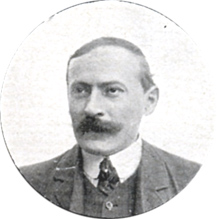Alphonse Merrheim
| Alphonse Adolphe Merrheim | |
|---|---|

Alphonse Merrheim
|
|
| Born |
7 May 1871 La Madeleine, Nord, France |
| Died | 23 October 1923 (aged 52) |
| Nationality | French |
| Occupation | Metalworker |
| Known for | Syndicalism |
Alphonse Adolphe Merrheim (7 May 1871 – 23 October 1923) was a French copper smith and trade union leader.
Alphonse Adolphe Merrheim was born on 7 May 1871 in La Madeleine, Nord, a suburb of Lille. He became a coppersmith, and adopted revolutionary syndicalist views. He arrived in Paris in 1904, and soon after met Pierre Monatte at the office of Pages Libres. The two men would work together to launch La Vie Ouvrière (The Worker's Life). Bourchet was secretary of the copper workers' union, and when it merged with the metalworker's union, he became head of the combined union. Bourchet resigned abruptly, and Merrheim was persuaded to take on the leadership. He became secretary of the Fédération des Métaux (Federation of metalworkers) in 1905.
Merrheim was immediately thrown into dealing with strikes at Cluses, Hennebont and Meurthe-et-Moselle. He discovered the power of the employers and the need to strengthen the labor unions and to coordinate the different trades. He was pragmatic, impatient with theoretical debates, and saw the need to understand the realities of the capitalist system and to understand what the employers were doing. During the period from 1904 to 1914 Merrheim became recognized as a leader of the French trade union movement.
Merrheim was one of the architects of the Charter of Amiens. The Charter, passed almost unanimously at the GCT congress in Amiens in October 1906, asserted a separation between unions and political parties. Members of unions could freely participate in the political parties as they chose, but the unions should unite in direct economic action against employees. As a revolutionary syndicalist, Merrheim said that the unions could break laws that stifled them. He was one of the first to foresee the coming of World War I (July 1914 – November 1918). In 1908 Merrheim attended a Congress in Marseille where he compared the present situation to that of 1870, when the result of the Franco-Prussian War was to destroy the first Workers' International.
...
Wikipedia
